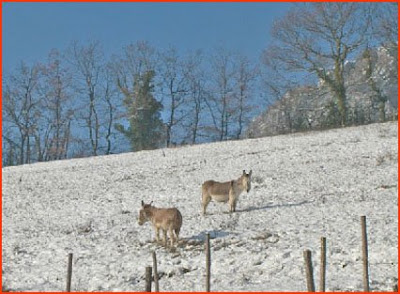I'm always impressed by a dog that's smart enough to play tricks on the supposedly superior beings who think of themselves as the animal's masters. As of this afternoon, I realize that my neighbors'
Briska belongs to that canine category.

In fact, I often suspect that
most, if not
all, dogs might belong to this smart category. The great US writer
Kurt Vonnegut [1922-2007] published a collection of short stories under the title
Welcome to the Monkey House. His book includes a tiny masterpiece entitled
Tom Edison's Shaggy Dog, no more than seven pages long. The gist of this delightful tale:
Thomas Edison [1847-1931], the celebrated inventor of the light bulb, happened to concoct a so-called
intelligence analyzer capable of indicating what we would now call the IQ of the individual hooked up to the machine. Well, when Edison tried out the device on his dog, he was astounded to obtain a genius-level reading. Edison's dog, on the other hand, was furious to realize that its master was henceforth capable of revealing the
Great Secret: namely, that dogs have always been vastly superior to humans from an intelligence viewpoint. The canine race preferred to keep a low profile, indefinitely, enabling them to be housed gratis, fed for free and admired by humans. In return, they were expected to give merely a minimum of Christian canine love: mainly effortless sloppy licks and tail wagging. From a dog's viewpoint, this continued to be a truly superb system! To avoid letting the cat out of the bag (wrong metaphor), Edison's dog struck up a bargain with its master. If the inventor were to keep quiet about canine intelligence, and destroy his diabolical contraption, then the dog was prepared to offer Thomas Edison the perfect formula for the filament of an incandescent electric bulb...
Let me get back to Briska. This afternoon, in front of my house, Madeleine was crying out:
"William, Briska's caught in a trap. Phone Dédé and tell him to drive up here immediately."I did as ordered, then rushed downstairs, donned boots and a jacket and raced up to the place, a couple of hundred meters above my house, where I could hear Briska barking furiously. Madeleine raced after me. I soon ascertained that the barking came from a spot on the muddy banks of Gamone Creek, at about the level of Bob's place.
Me:
"Madeleine, Briska's barking doesn't sound as if she's in pain."Madeleine:
"Don't be silly, William. She's in pain! I can recognize her barking. She's surely caught in a fox trap. Maybe gored by a wild boar. When you find her, be careful. She's probably out of her mind, and she's likely to bite you."I lost no time in racing up the creek bed and sighting Briska, several meters up on the banks. She was still barking, and darting back and forth, as if she were restrained, unable to come down. By this time, Dédé had arrived on the scene with his vehicle. Meanwhile, not wishing to be bitten by a delerious dog in agony, I did my best to push Madeleine up the muddy embankment, so that she might encounter the animal. Both of us struggled to catch hold of branches and pull ourselves upwards. Dédé, down in the creek bed, could see Briska moving to the right, then to the left, then back again, while continuing to bark furiously.
I might add (because I believe that this observation is significant) that I was intrigued to notice that my dear dog
Sophia gave no signs whatsoever of understanding what the hell all this fuss was about. Sophia is a little like General Motors in the USA. When she coughs, this indicates that all Gamone might be catching a cold. But when Sophia behaves soporifically, it's highly likely that everything's perfectly fine at Gamone, that there are no murderous bandits in the vicinity and, concerning the problem confronting us, no dogs in pain.
Dédé (who remained down in the creek, where it was impossible to see what was happening, since he has trouble walking, let alone climbing creek banks):
"Briska's almost certainly caught up by a wire or cable. She can't come down."Madeleine (in living-room attire, including woolen gloves, and no longer accustomed to crawling up muddy creek banks in the middle of January):
"I've got hold of her collar, but she refuses to descend. The poor dog seems to be wounded. She's terrified of the height of the embankment."While doing my best to hold Madeleine in place—by poking my fingers, as it were, up her backside (I insist upon the "as it were")—so that she wouldn't roll back down into the creek, I was starting to become wary. It was more and more obvious to me (but not yet to Madeleine or Dédé) that their dog was
not caught in a trap, was
not attached by anything whatsoever, was
not wounded in any way, was
not in pain, was
not afraid of heights, was
not barking in anguish, etc. In other words, there was nothing whatsoever wrong with Briska. She had merely been having fun at that particular spot on the banks of Gamone Creek (which was running with a foot or so of water), and wanted to let us all know. Briska was thinking no doubt, in typical dog thought, that we might like to join in the fun. She had been inviting us to a rave party, as it were.
As soon as I got within reach of the dog, who was now held firmly by Madeleine (sprawled out face down on the muddy slopes), I gave her a big push on the arse (Briska, not Madeleine), which sent her rolling down towards Dédé, who immediately put her on a lead. Meanwhile, Madeleine's hand was covered in blood. We had imagined that it was the blood of our poor wounded Briska. In fact, Madeleine had cut herself slightly on a broken branch above Gamone Creek.
For the moment, the global situation is a little like that of the Airbus in the Hudson River. Nobody has located Briska's black boxes, capable of informing us what the hell all that bloody barking was about. All I can affirm is that it was a false alert, brilliantly executed by Briska... who must be erupting into dog-laughter at the moment I speak to you. (I don't know whether our dog is linked to the Internet, otherwise I would simply suggest that you look her up directly.)
I don't wish to influence the specialists who'll be called upon to examine the data of this afternoon's incident:
Françoise Repellin, above all, daughter of Dédé and Madeleine. My gut feeling is that Briska was thrilled to have discovered, on the banks of Gamone Creek, a tiny smelly Garden of Eden where the roe deer come down to lie. Maybe there was even the delicious aroma of a decaying foetus, or something nice like that. And Briska decided to remain obstinately fixed in this marvelous site of discovery, like a successful archaeologist standing guard over his treasures. Meanwhile, Briska barked gladly, proudly, non-stop, like hell, for all the Gamone valley to know, like a dog in agony. Nothing could move Briska from that paradise... until I gave her a shove in the arse.
This evening, more than ever before, I love and admire that delightful dog Briska, poorly educated and unaccustomed to obeying orders from any human master or mistress (including Françoise), but more playful and smarter by far than oldies like Madeleine, Dédé and me.
Let's face it: Dogs were made to be movie stars. Briska [to whom this blog post is dedicated], you're a cunning canine artist!
ADDENDUM: My neighbor Gérard Magnat, who's an experienced hunter, gave me a firm opinion on this incident. He concludes that Briska had come upon a wild boar drowsing on the creek bank. Apparently a boar isn't particularly impressed by a barking dog, even at close quarters. Roe deers, on the other hand, are terrified by dogs. The boar is sufficiently powerful to rip open the belly of a dog with a single upward thrust of its tusks. Gérard tells me that a boar is capable of carrying on its snoozing when surrounded by several barking hounds. But the boar will run like hell as soon as it sniffs the presence of a human being. Don't ask me why it finds us more fearful than dogs. So, according to Gérard, the boar was probably still snoozing calmly, and Briska was still barking furiously, right up until the moment I set foot in Gamone Creek. With all the barking, I would have been incapable of hearing a beast fleeing through the branches. It's a fact that Briska toned down her barking as Madeleine and I edged nearer. In fact, Briska was no doubt disappointed to find that we didn't appear on the scene like Saint George or Zorro, and rush into a mortal combat against the black dragon she had discovered.
 In the latest Télérama weekly, there's a fine review of the film:
In the latest Télérama weekly, there's a fine review of the film:














































